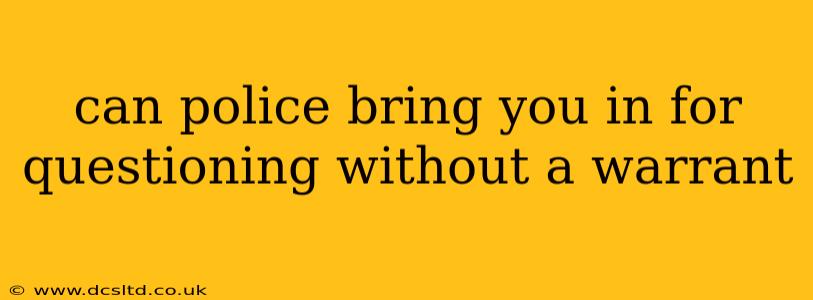The question of whether police can bring you in for questioning without a warrant is complex and depends heavily on the specific circumstances. While the short answer is generally "yes," under certain conditions, it's crucial to understand the nuances and your rights. This article will explore the legal framework governing police questioning and detention, addressing common concerns and misconceptions.
What are my rights if the police want to question me?
Your rights significantly depend on whether you are considered to be "detained" or merely "being questioned." If you're simply being asked questions in a public place and feel free to leave, your rights are primarily to remain silent and to ask for a lawyer. However, if the police restrict your freedom of movement—even subtly—you are considered detained and your rights expand. This is when the specifics of warrant requirements come into play.
Can police stop and question me on the street?
Yes, police can stop and question you on the street. This is often referred to as a "Terry stop," named after the Supreme Court case Terry v. Ohio. A Terry stop allows police to briefly detain you if they have reasonable suspicion that you've committed, are committing, or are about to commit a crime. Reasonable suspicion is a lower standard than probable cause, which is required for an arrest. Crucially, during a Terry stop, the police do not need a warrant. However, they must have a specific and articulable reason for the stop. If they don't, the stop is considered unlawful.
When do police need a warrant to bring me in for questioning?
Police generally need a warrant to arrest you and bring you to the station for questioning. A warrant requires a judge to determine that there is probable cause to believe you committed a crime. However, there are exceptions. These exceptions are often based on the immediacy of the situation or the severity of the crime.
What are the exceptions to the warrant requirement for arrest?
Several exceptions allow police to arrest someone without a warrant, potentially leading to questioning at the station. These include:
- Probable cause and an arrest in public: If a police officer has probable cause to believe you committed a crime, they can arrest you without a warrant, as long as it takes place in a public place.
- Exigent circumstances: This refers to urgent situations, like a hot pursuit or when evidence is about to be destroyed. In such situations, the police can act without a warrant.
- Consent: If you voluntarily agree to accompany the police to the station for questioning, they don't need a warrant. This consent must be freely and knowingly given; it cannot be coerced.
- Search incident to lawful arrest: If you're lawfully arrested, police can search you and your immediate surroundings without a warrant. This is to ensure their safety and prevent the destruction of evidence.
What if the police detain me without a warrant illegally?
If you believe you have been illegally detained, you should remain calm and remember your rights. You have the right to remain silent and the right to an attorney. Document the incident as much as possible (time, location, officers' names, etc.), and seek legal counsel as soon as possible. Any evidence obtained illegally may be inadmissible in court.
Can I refuse to answer police questions without a lawyer present?
Yes, you absolutely have the right to remain silent and request a lawyer. It's advisable to exercise this right. Anything you say can and will be used against you in court. Insisting on a lawyer doesn't imply guilt; it's simply protecting your legal rights.
This information is for general knowledge and informational purposes only, and does not constitute legal advice. For legal advice regarding your specific situation, consult with a qualified attorney.
